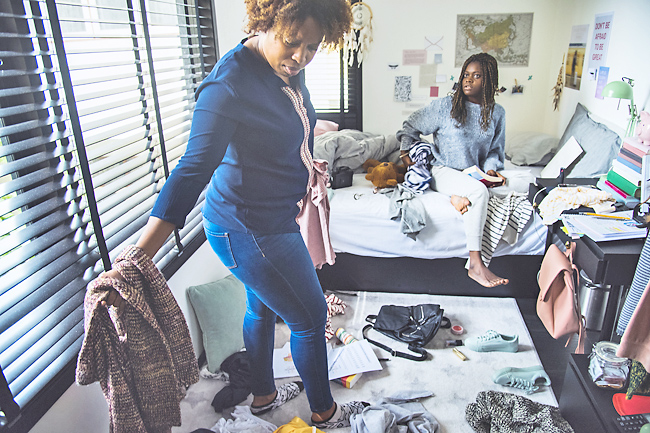Meghan Leahy
THE WASHINGTON POST – Mother of three daughters and the author of Parenting Outside the Lines Meghan Leahy answers a question from the mother of a very disorganised teenage girl. Meghan holds a bachelor’s degree in English and secondary education and a master’s degree in school counselling and is a certified parent coach.
QUESTION: I have an almost-13-year-old daughter whose room is generally a disaster. She has more stuff than she can manage, because she’s reluctant to let things go. She really doesn’t play with her remaining childhood toys, but she doesn’t want to give them up. She is reluctant to purge outgrown clothes or items she doesn’t wear. At pretty much any time, you can open her dresser drawers and find a mix of clothes, trash, used towels and dirty cups.
There is ongoing drama in my house about socks, because she can’t keep track of hers and will routinely take mine or my other child’s. I have purchased dozens of socks this year trying to combat this ongoing sock madness.
I am willing to help her with cleaning, sorting and purging, but I’m generally not welcome in her room. We have her slated to start working with a therapist soon after months of searching for one. (She has pretty typical middle school angst, as far as I can tell). In the meantime, how do I respect her privacy while also making progress toward getting community items (such as cups and towels) returned – and maybe even getting some socks back, too?
ANSWER: Thanks for writing in! Tweens having messy rooms is not unheard of. In fact, it’s pretty common. There are certainly tweens who care greatly about their items and their organization, but for the most part, tweens and teens only care about what’s important to them.
For instance, I was a stickler for how and where my CDs were arranged (I know that I just aged myself), but my clothes were a mix of dirty and clean – and they were strewn everywhere. And I mean everywhere.
As for your essential question of how to respect her privacy while also making progress toward getting your household’s community items returned, I certainly have advice for that. First, your child is not a little girl anymore. The days of “let’s clean up while singing the ABCs” are long over, but that doesn’t mean you can’t work together.
I recommend having a weekly – or even daily – meeting with small goals to take on daily, weekly and monthly. Together, agree on where you can focus on one item (socks seem to be a hot topic) or one area of the room (the dresser). And don’t be afraid to make it fun.
Allow her to set a timer and DJ the cleanup. Create concrete rewards that come with cleaning, and any progress can be met with sincere gratitude.
You could also put consequences in place if a cleaning schedule is not adhered to.
Overnight stays, meet-ups with friends or tech time are common privileges that could come off the table if your daughter doesn’t uphold her end of the bargain. You could make it clear that if, for instance, the goals you’ve co-created aren’t met, you will collect the trash that poses a health threat to your home and family. But try to resist the urge to take a black trash bag and rage-clean. It will feel (and look) good, but you may compromise your relationship with your daughter.
I also see you are slated to work with a therapist, which I’m happy about, because I’m wondering whether something else is going on. Hoarding has not been a stand-alone diagnosis in the DSM-5 for long; in fact, hoarding used to be classified as a criterion of obsessive-compulsive disorder. But the difference between the two is clear: OCD is experiencing recurring thoughts, urges or images and compulsively trying to make them stop, while hoarding is having difficulty in letting go of collected items. My advice is to hold off on any plans or ideas with her until you find the right therapist and learn more about her. Regardless of whether your daughter is diagnosed with hoarding or not, I strongly encourage you not to consider this mess, or her attempt to steal socks, a moral failing. Yes, you may need to hit Costco for extra socks, plates and cups, but whatever plan you create should be done with her therapist’s help, as well as consistent and compassionate boundaries. This can get better, so don’t give up.
Good luck!




















































